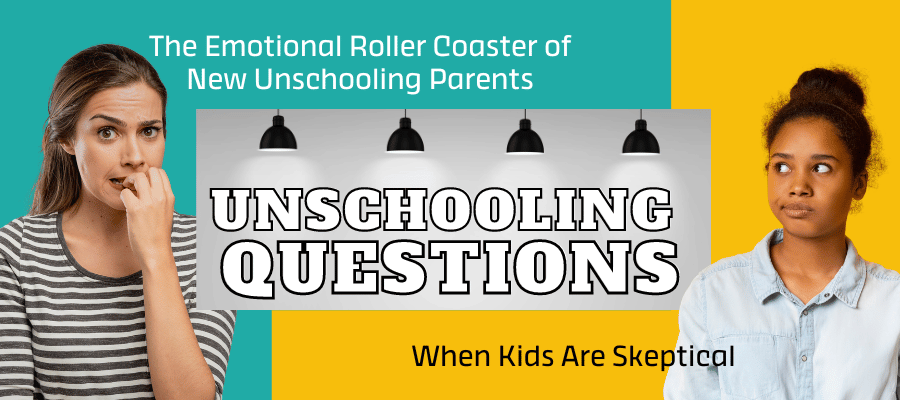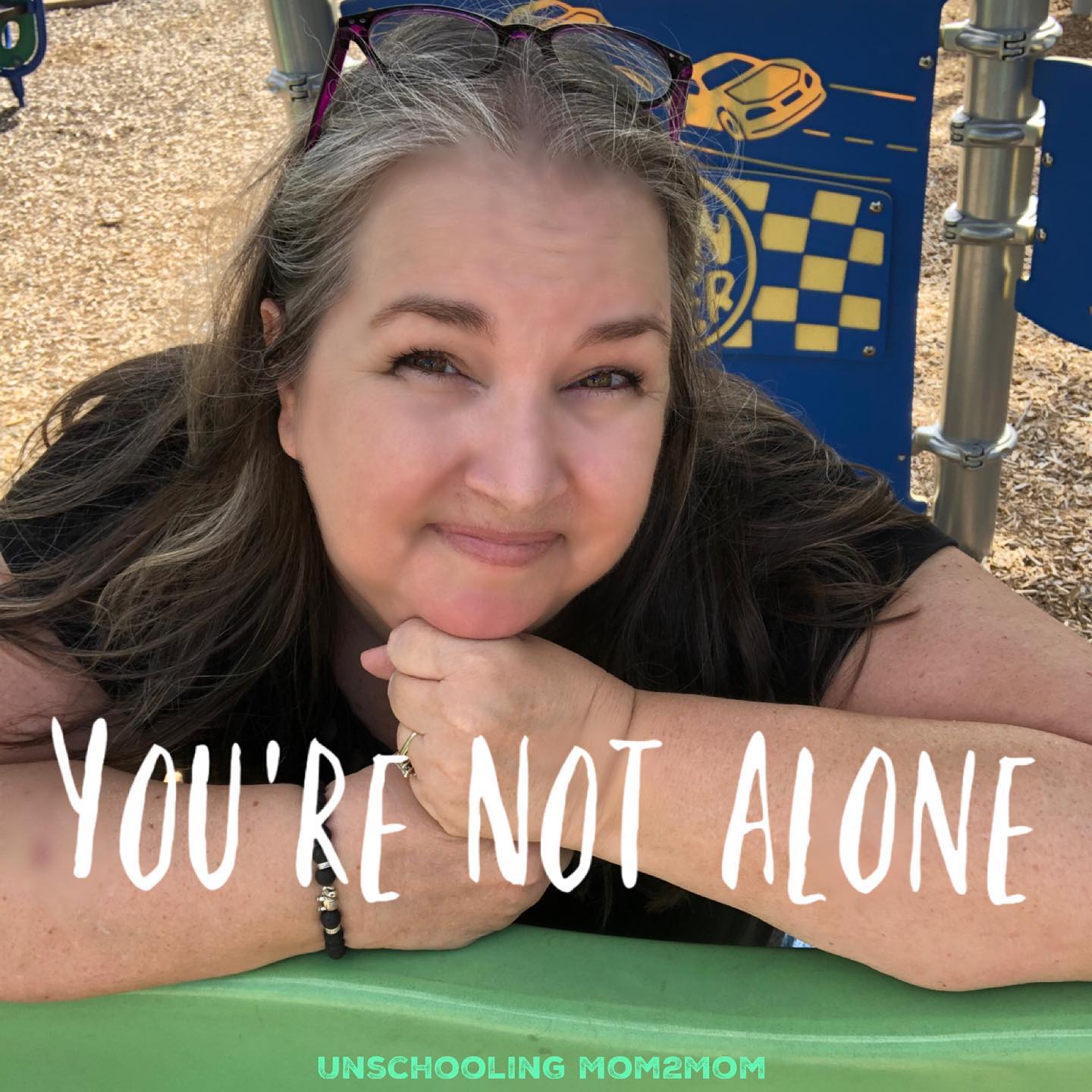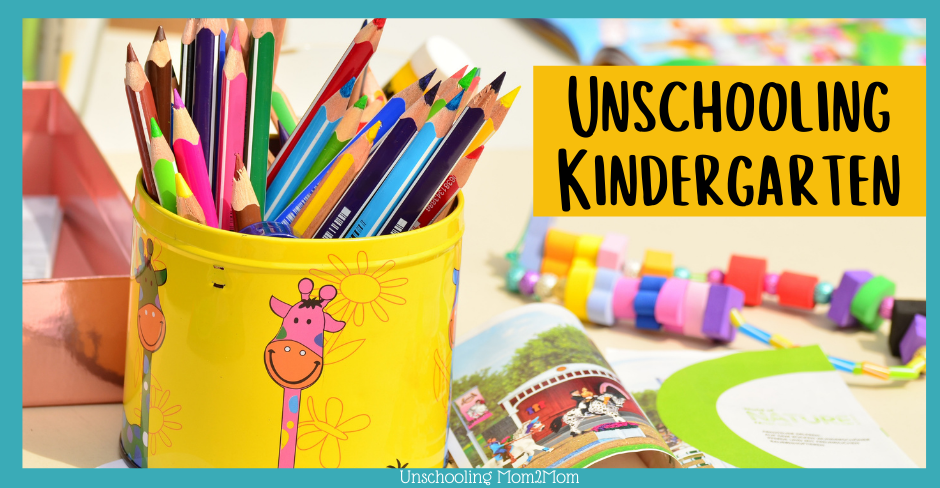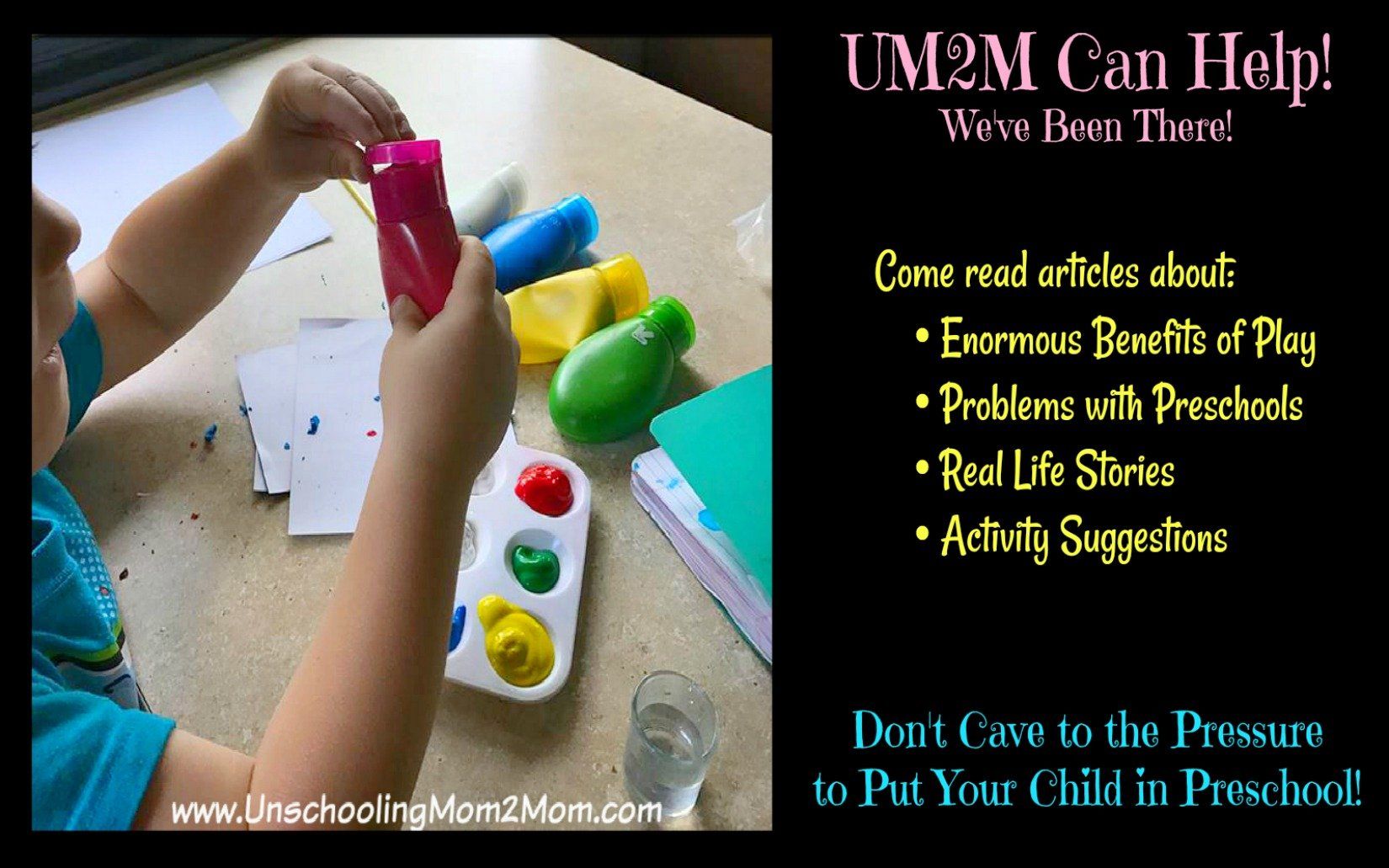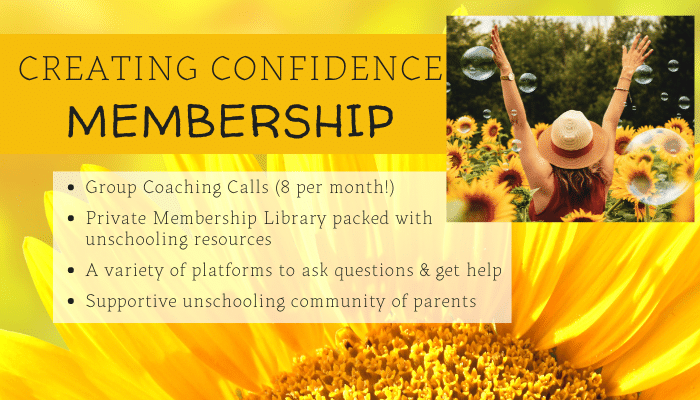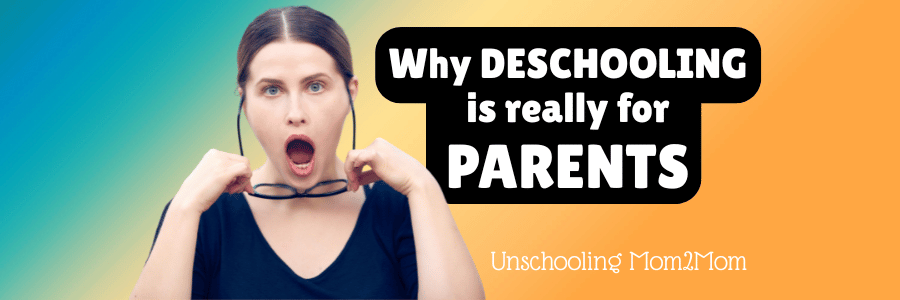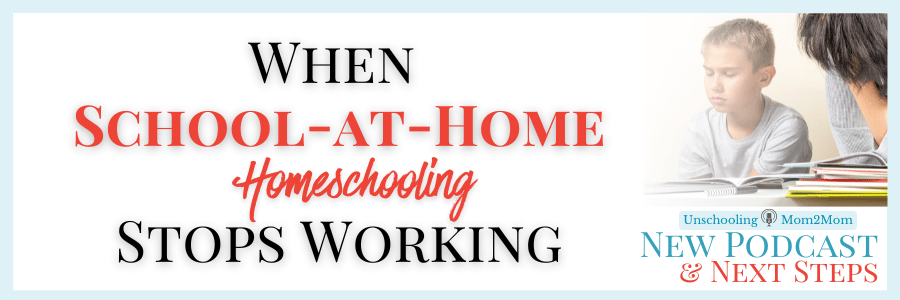Unschooling Q & A
When you're new to unschooling ....
and
What to tell the kids when they're skeptical...
I did an Unschooling Q & A
webinar last week
- it’s up at the
Unschooling Mom2Mom YouTube channel, if you’d like to see it!
But more questions rolled in and I didn’t get a chance to answer them all!
So I want to answer a couple of them here on our
Unschooling Mom2Mom Podcast.
And maybe every month or so, I can do this - just a few questions and answers.
I’ll set up a form you can use to submit a question for future podcasts too!
2 Unschooling Questions
This week, we’ll tackle two questions about unschooling. I know there are way more than that, but since this is only a 10 min podcast, we’ll just do 2 at a time.
OH! And if you have a question that you may just need resources to read up on it DIY-style, you can send the question to Q4Sue and Katie will send links to you! I’ll put the link in the notes for you.
This week’s 2 questions are:
- The emotional roller coaster of just beginning - especially when the kids are young and have never been to school. And we’re a little freaked out from all the responsibility.
- How do you respond to kids who are used to a more traditional setting - and they want to know, “When are we going to start?”
Nice to Meet You!
But if you’re here for the first time, I’m Sue Patterson and I help parents see how unschooling works. My own three kids are grown now and we didn't duplicate school. No grading, no lesson plans, no Friday quizzes - we traded all that for a learning approach that STARTED with their interests and then rippled out from there. Doors were not closed because of this unconventional choice - instead more opened. They had more life experiences and could try things out... as opposed to waiting for Life to start after school, on the weekends, or after graduation.
I have 27 years of experience to share with you, what worked and what didn’t. There’s no reason for you to reinvent the wheel... and frankly I would love to walk alongside with you holding your hand helping you through the scary parts.
Let's get to our questions...
Unschooling Question 1
Our first question comes from a Abigail in Tennessee...
This will be my first year of homeschooling at the beginning of August in a state with fairly low homeschool regulations. I’m experiencing a wide range of emotions including anxiety, excitement, along with feeling terrified and overwhelmed just to name a few. My daughter is 5 1/2 and my son is 3. What would be the best advice you’d give to someone in my shoes? This can be as concise or elaborate as you feel is sufficient. I appreciate you and all of your valuable knowledge and expertise!
😅
Best advice...
Notice where your anxiety is coming from.
This will help you know how to tackle it. You won’t have terror and overwhelm if you can focus your attention on getting the information you need. AND sometimes, it’s multiple fears... so you have to break them apart. If you let them all swirl together, you just begin to hyperventilate and never get to the solution. Write them down. See if they’re even true. I have all sorts of journaling pages in the Membership group, if you want more help with this. We spend a lot of coaching calls talking about overcoming fears and gaining confidence.
But a few tips I’d give:
1)
Think about your “Why?”
This will sustain you when you’re having a bad day - or a middle of the night panic attack. Get a journal where you can write it down, add to it, refer back to it.
What's Your Why?
2) Learn more about creating your own educational philosophy. I know, it sounds DEEP.
But think about what your beliefs are...You can listen to more about this in Podcast #10 (I’ll link it)
Unschooling and Educational Philosophy
But think about what your underlying beliefs are about learning, and parenting. We have embraced a lot of ideas from school, society and our own upbringing - without really questioning or thinking about it. Unschooling is one of those things that moves us toward being more intentional - even on these kind of bigger topics. Because they factor in on our day-to-day responses to our kids - and the worries that pop up in our minds.
3) Observe instead of Instruct.
Notice instead of Fix.
Listen instead of Talk.
I know. It’s hard. But spend the next few months intentionally moving in this direction.
- How do your kids learn best?
- Do they have a time of day that they seem to fall apart?
- What kinds of factors are happening to maybe cause this? Are they hungry? Frustrated? Are they less connected with you at the time? What?
- Do you have time of day where you connect better with them?
- What contributing factors make this happen?
This is the same parenting issue that we’ve all heard about... Remember when they said,
“Don’t fix the bed-making attempt by a 3 year old, even though it’s messy and not what you want... How this undermines their efforts.”
This same kind of tendency is happening as they get older.
We want to get in there and spruce things up.
We want to call attention to where they didn’t quite get it right.
What if we just zip it for a little while.
See what happens without our overarching orchestration.
We’ll learn more about how the family operates.
Really, there’s so much more to this,... no way I can fit it into the 5 minute slot!
Because the next step is to
4. Notice the Learning.
Put yourself on a Scavenger Hunt.
I have a lot more about how to do that with Math in the
Learning Math Without Curriculum course... but you could do it with any subject you’re worrying about.
Make a deal with me, if you’re skimming the internet looking for a particular subject, do this Scavenger Hunt technique first. Look around to see where it may ALREADY be happening in your lives
... in the games
...in the conversations
...at the grocery store
...or maybe online or in a movie reference
Real Life has so much to offer! Check there first.
I do have an
Unschooling Kindergarten blogpost that might help you.
And and entire
preschool section at the website. I’ll link both of these.
All right, Abigail - or anyone else in the same boat - that should get you started!
Unschooling Question 2
Next question comes from Vee in Texas with kids a little older:
How do you explain unschooling/deschooling to your kids (mine are aged 7-11)? They are asking questions that I have seen answered for parents, but I haven't been able to find explanations for kids and mine are very confused (Examples: Are you going to teach us? Are we using books, how am I going to learn if we don't have subjects/tests/text books/class, what do we do? Is it summer because we aren't doing anything? I don't know what I want to learn, can't you just tell me?)
OK, One of the things parents do that doesn’t really work is to ask the kids,
“What do you want to learn?”
I know, unschoolers tell you to move in that direction. But when kids are used to someone else telling them what to do, that little light is very dim inside them.
So don’t ask.
Instead, watch.
Suggest.
Then watch the reaction.
Don’t move in the direction of academics...think instead of topics.
Is it Shark Week on TV?
Are you putting in a new flower bed? Take them with you and see what they like the look of. Talk about annuals vs perennials, sun-loving or shade plants. See if they can help you find some that would work.
OK... maybe you’re not into gardening or you’re in the southern hemisphere and it’s getting colder... my point is to include them in whatever is going on in your home.
Maybe they could help with food coloring on the the frosting for cupcakes.
I’m not talking about helping you with the project of cleaning out the garage. I mean, you may have to have help for that, but it’s YOUR project, not theirs. Let’s not blur those together.
So think about what could make their life more fun...move in THAT direction.
But back to the question about
how to explain unschooling to kids that are confused.
I did a private podcast for the teens whose parents are in my membership group... because you know me, I have a lot to say!

So some of the points from that, will be useful. We’ll use it to answer some of the specific questions Vee has.
Are you going to teach us?
"We’re going to shift to learning together. I’ll show you things and as time goes on, you’ll find cool things too. We aren’t going to have the lesson plans the same way though. We’re going to use our Real Life as our Jumping off place. Don’t worry, it will be ok. I’m right here with you!"
Are we using books, how am I going to learn if we don't have subjects/tests/text books/class. What do we do?
"All of those are ways SCHOOLS teach because they have a big system built around moving 20-30 kids through a specific set of material. It’s only ONE way to learn though. Not even the most efficient. And certainly not necessary when it’s just us. We’re going to take an approach that is more about the Learning than the Teaching. It doesn’t sound that different, but it is. But that’s something we, the parents, will be thinking about - you don’t have to."
Is it summer because we aren't doing anything?
"Ahhh...that’s where you’re wrong! Even just playing, you’re learning so much! You’re sorting and categorizing, you’re creating strategies and problem-solving. Did you know that when you see a problem, make a guess at what the solution is, and then work to figure out if it’s correct or not - that’s using something called the Scientific Method. Really, your whole life is living out one Word Problem after another!"

So, we may need to remind them...
Don’t worry about not knowing what you’re supposed to learn - or even what you want to learn.
There’s no “supposed to” in there.
Who says anyone has to learn things by a certain age? We’re going to learn when we need it.
That’s how we’ll remember anyway - because it will be interesting to us. Random facts don’t really stick with us. We might remember them for a quiz at the end of the week - and then completely forget about it.
So what was the point of all of that? Nothing.
One thing I know and have read a lot about is that
humans are naturally curious and hardwired to learn.
That’s the little fire inside you that want to know more about… all kinds of things. It gets a little dimmed when you have to jump through all the hoops of subjects and topics you don’t really care about… there’s no energy left to explore. So we are going to use THAT as the starting place!
We’re going to use the whole world as our classroom.
When we watch a show, we might talk about it, or look something up about it.
When we go to the farmer’s market, we might find out where their farm is and look it up on our map.
When we have a stomach ache, we might learn about digestion and nutrition - or other pieces of anatomy, physiology or health.
Unschooling is simply a style of homeschooling.
We might use books, but it’s not the only way. We learn from YouTube, from conversations, from googling, from museum trips or playing with games or toys. Learning is ALL around us.
So maybe it would be helpful to go on a scavenger hunt like I mentioned earlier in the podcast. Find the subjects that are weaving through your day and your life. All the kids have to do is keep exploring.
You Don't Have to Do This Alone!
Sometimes it helps to walk along this path with someone who's done it themselves
and in community with other parents who are learning more about how to unschool in their homes!
Don't miss out on the support you need to figure all this out.
In a nutshell:
- The school approach is just one way to learn. The world is our classroom.
- School offers a one-size fits all approach - unschooling allows us to learn what interests us.
- We don’t have to plan ahead to set up ways to learn - Life will bring us opportunities. We just have to notice.
- We will partner together to figure out our next steps - it’s going to be such a fabulous adventure!
So that’s what I have for this week. Enjoy the kids.
Reach out if you want to dive deeper and need more support.

